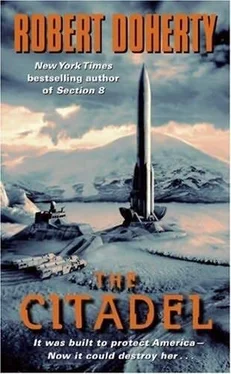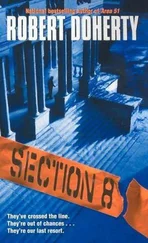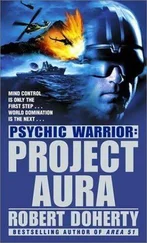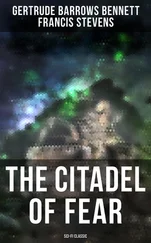Kim Jong, long the designated heir to Kim Il Sung, and now the ruler, rubbed the side of his face. The recent reduction of American forces in South Korea had left that threat a paper tiger. With the Americans embroiled in Iraq and Afghanistan, they were stretched perilously thin. Kim had no doubt his massive army-sixth largest in the world-could now overcome their enemies to the south. The problem was the real threat the Americans still held: their tactical nuclear weapons.
Korea is a land of mountains and narrow plains. It is along those narrow plains that any offensive movement has to advance. And tactical nuclear weapons were the ideal countermeasure to such movement. If that one factor could be removed, the entire balance of power in the peninsula would shift to the North's favor.
In late 1991 the United States had removed all tactical nuclear weapons from the peninsula itself in a gesture to force the North Koreans to abandon their nuclear weapon program. The gesture had been ignored for the simple reason that it was seen as an empty one. The Americans maintained more than enough tactical nuclear weapons on the planes, submarines, and cruise missiles of the Seventh Fleet to more than make up for the lack of land-based ones.
Orange III was the classified operations plans, known as OPLAN, for a northern invasion of South Korea. Unfortunately, Kim Jong Il rued, his father had never approved the implementation of the plan because of the high risk and cost potential if it failed-and fail it most likely would if the Americans used their nuclear weapons.
The fact that the North Koreans had their own small arsenal of nukes did not change that balance for two simple reasons. First, they only had limited abilities to project those weapons a few hundred kilometers into the south-they could never touch the United States itself to keep it from using the weapons. Second, tactical nuclear weapons favored the defender-not the attacker.
But now there was a window of opportunity. This new information could make Orange III a reality if it was used properly.
Kim looked up at his old friend. "I cannot believe that the American government has abandoned nuclear weapons in this place."
Yol smiled, showing stained teeth, the result of constantly smoking cigarettes. "Imperialists are like that, sir. Not only does one hand not know what the other is doing in the U.S. government, but fingers on the same hand are often in the dark as to the action of the other fingers."
"But the bombs-how could they have just been left there?"
"I don't know, sir. But it appears they are. Unguarded for the time being. We must seize the opportunity."
Kim was more cautious than his military commander. "Could it be a trap set by the Americans?"
Yol considered that very briefly. "I see no reason for the Americans to do that."
"But can we use these weapons even if we find them?"
"That, I do not know until we get our hands on them."
"And how can we do that?" Kim asked.
Yol turned to the map. "It is a long way," he admitted. "But we need not have to cover the entire distance."
Kim frowned. "Why not?"
Yol pulled down a larger scaled map that showed the entire Pacific region all the way down to Antarctica. "Because we have a team that could do the job right here." He tapped the map, indicating Indonesia. "If you will give me the permission, sir."
"You have a plan, then?"
Yol smiled. "Yes, sir."
Kim settled back in his seat. "Let me hear it."
Yol tapped a button, and three Special Forces officers carrying charts and paper hustled into the room. A lieutenant colonel took over the briefing, his pointer going to the same spot in Indonesia. As he progressed, the pointer slid down to Antarctica and then north again, but didn't come back to the Korean peninsula.
At the end of fifteen minutes, Kim had caught Yol's enthusiasm. The briefing officers wrapped up and left the room, leaving the two of them alone. Kim Jong II had known General Yol for his entire adult life. He had only one question for his old friend: "It is a very daring plan. You think you can do it?"
"Yes."
"Send the message and begin all the preparations."
Antarctica
Vaughn slid to a halt and looked back over his shoulder. The plane didn't look very far away, but he estimated he'd come at least four miles. He reached for the sonar emitter slung over his shoulder and pointed it down. As he pressed the trigger, he watched the small screen on the back. Negative. After five seconds he turned it off and reshouldered it.
Every thirty push-offs with his right ski, he halted and repeated the process, with the same negative result. At least the cross-country skiing felt good and kept him warm. He was moving north, so he had the mountains to his front. His course was centered on the middle peak. He estimated it was about four to five miles ahead of him, and sensed he was moving slightly uphill as he continued. The surface was definitely not as flat as it had appeared from the air, and he appreciated Brothers's talents even more. Occasionally Vaughn crossed low ridges of compressed ice and had to traverse to get over them.
Twenty-seven. Twenty-eight. Twenty-nine. Thirty. The echo just below the surface shocked Vaughn for a moment. He blinked and stared at the screen for ten seconds. It was still there. He looked around the immediate area. The surface ice was relatively even except for a six-foot ridge running in an angle across his front. There was no sign of anything man-made.
He pulled his backpack off, slid out one of the thin plastic poles with a flag attached and stuck it in the ice. Then he began to ski, ten paces only now, past the flag, trying to search out the dimensions of whatever it was under the ice. He continued to receive a positive response as he approached the ridge.
Vaughn traversed up the small incline of ice and stood on top of the buckled ice. His flag was over eighty meters away. This had to be the base. He noted an outcropping from the ice ridge about ten meters away and skied along the top to it. Snow had piled up, forming a large block, perhaps fifteen feet to a side and eight feet high. Vaughn aimed the sonar into the snow pile. Positive response. There was something in there too.
He looked to the south. His view of the plane was blocked by a large ridge he had crossed about a mile back. He secured the sonar over his shoulder and skied down off the ridge and back to his ruck. He was getting tired but threw it over his shoulder and set out to the south with long distance-eating glides on the skis.
* * *
Tai shivered and considered asking Brothers to crank the engine to get the heat going, but she held off. They only had so much fuel, and they'd been on the ice for almost three hours. The windows had fogged over from the breathing of the remaining occupants, and she used her mitten to scrape a small hole in her porthole so she could peer out.
A figure appeared on the horizon, skiing toward the plane with smooth, powerful strides. She kept the glass clear and watched the bundled man come closer.
"One of them is back," she said.
Smithers swung open the side door, and the wind removed what little body heat had built up inside the plane. The skier stepped out of his bindings and passed the skis in, where Smithers slid them along the floor. The man stepped in and shut the door behind him.
"Anything?" Tai asked as Logan slid his parka hood down.
"Nothing." He slumped down in his seat and leaned back. "I went about eight kilometers out and took a slightly different route back and picked up nothing."
There was a roar as Brothers started the engines. In a minute welcome heat poured out of the vents, and the windows started slowly clearing.
"Let's taxi north and pick up Vaughn on his way back," Tai suggested.
Читать дальше











